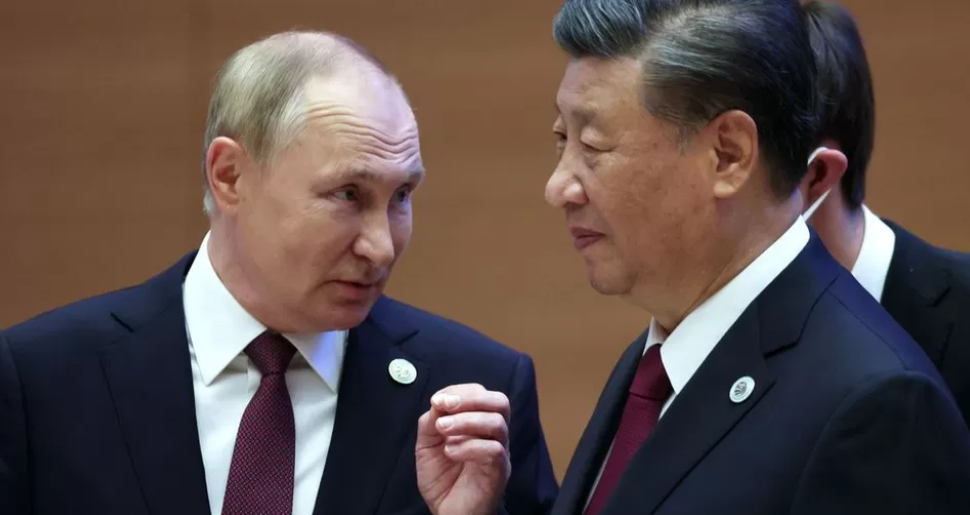In international politics, sanctions have become all the rage. The United States and its allies impose them with increasing frequency and severity on adversaries. And these competitors are retaliating wherever possible.
Today, American states are also becoming increasingly involved. And this is bad news for the world as well as for American foreign policy. A highly publicized incident involving a Chinese balloon entering American airspace appears to have rekindled interest in such limitations since at least 11 states have filed legislation in response.

Sanctions have been imposed on China and Russia by the United States.
On Wednesday, the South Carolina State Senate approved a law prohibiting people of US geopolitical rivals Russia, China, North Korea, Iran, and Cuba from owning land in the state. The chief author of the law even linked a Chinese biotech company’s proposed acquisition of land in South Carolina to the Trojan Horse plot from Greek mythology.
In the meanwhile, Texas State Senator Lois Kolkhorst has introduced a similar measure that has garnered heavy criticism on human rights grounds but has been supported by the state’s Republican governor, Greg Abbott. A simple reading of the original form of this measure would lead one to the conclusion that people of the aforementioned nations and the corporations they own would be prohibited from owning property. This would have encompassed dual-citizenship American citizens. Since then, the language has been amended to protect dual citizens and permanent residents, but not visa-holding citizens of those nations residing in Texas.
The use of such wording would impose novel and uncommon due diligence obligations on transactions involving common property. Creating unique property ownership limits for diverse immigrant populations raises human rights problems.
Current sanctions legislation and Treasury Department designations prevent these American opponents’ leaders from moving funds into the United States or acquiring property here. In the meanwhile, freshly announced congressional legislation seeks to prohibit American foes from acquiring vast tracts of farmland in the United States.
Why therefore would a state participate in something that is fundamentally an issue of foreign policy and national security?
Why penalize?
On the one hand, some historians believe that sanctions are frequently a result of domestic politics, intended to demonstrate strength to the people and sometimes influenced by “ethnic lobbies.” This group of academics is inclined to feel that punishments are not especially effective. If sanctions are intended to satisfy domestic observers, they will not be conceived and administered with effectiveness and the security environment in mind.
Some experts, on the other hand, contend that sanctions are indeed implemented in an effort to resolve national security problems.
Like many in the national security decision-making scholarly community, I believe that both of these binary conceptions usually fail when the history of economic sanctions is considered. Foreign policy decisions are the result of intricate national security matrices that incorporate both foreign policy and home political factors.
Who regulates?
Nonetheless, regardless of one’s stance on the usefulness of sanctions in general, it is difficult to dispute that measures against foreign people undertaken by state governments have little to no other explanation than internal and even local politics.
Foreign policy choices in the United States have historically been best made by the executive branch due to its clear mandate and resources in this area. Constitutionally, Congress has a role in foreign policy, but it is far more likely to be affected by home political pressures and national worries.
During the Cold War, the executive branch was primarily in charge of sanctions policy. With the collapse of the Soviet Union, however, and as domestic dangers diminished, Congress and sub-federal forces got increasingly active in this arena.
In spite of the fact that Congress has largely relinquished its war power authority in the contemporary period, it has been more active in sanctioning because to members’ desire to be perceived as projecting force against American foes, even if it hinders the president’s ability to engage in strategic strategy.
What about lawmakers and governors at the state level? They lack a true national security staff and the appropriate mandate, as their elections nearly usually lack any substantive foreign policy discussion and are determined by provincial concerns, such as taxation and abortion rights.
Yet, their interference in foreign policy is not useless; it may be risky for world diplomacy and American foreign policy. This is how.
The idiocy of government sanctions
As stated, it is doubtful that the listed restrictions will significantly hinder the federal government’s capacity to conduct foreign policy. Nonetheless, it is conceivable that penalties levied by governments may have this effect.
The states of New York and California are important hubs of the worldwide financial community and the international technological supply chain, respectively. Texas is a prominent participant in global energy markets. However, several governments possess a more limited version of these capabilities.
There are already cases of New York State targeting European companies for alleged violations of sanctions while disregarding federal complaints. States, like the federal government, can place limitations on businesses operating inside their borders that have extraterritorial effects.
In turn, this creates a risky dynamic. The federal government may be required to appease or deal with state governments run by ambitious politicians catering to specific interests or local constituents.
Similarly, state governments of the opposing party can use these penalties to aggressively undermine the federal government’s diplomatic efforts. A federal push to relax restrictions on Cuba, for instance, might generate political impetus for state sanctions in Florida, where families of people who left communist tyranny represent a formidable lobby.
In the end, sanctions are an instrument of foreign policy, and the ability to modify or even repeal them is crucial for achieving the political objectives underlying sanctions campaigns. It would be a bizarre new impediment to the federal government’s ability to carry out its foreign policy responsibilities if the president or Congress were required to lobby with state governments, each representing a fraction of the nation’s population, to alter America’s sanctions against a country.
The proposed statutes in Texas and South Carolina are typical instances of punishment as domestic political grandstanding. They are also a warning that amateurs in state-level foreign policy may foster and exploit nationalistic fervor.

